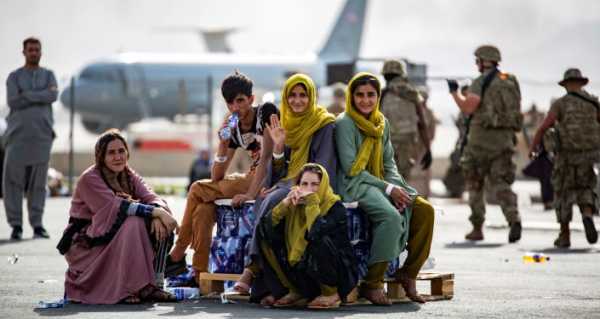
NATO member states have evacuated at least 12,000 people from Afghanistan in the past week following the Taliban’s* capture of Kabul on 15 August. But thousands more, including translators who assisted the US mission in the country, are anxious to get out.
With vivid memories of the 2015 humanitarian disaster, the world is cautiously waiting to see whether the Taliban’s power grab in Afghanistan will result in a new refugee crisis and whether the EU will be the one to take the hit again.
In Austria, a country that already hosts 40,000 refugees from Afghanistan, Chancellor Sebastian Kurz pledged not to take any more Afghan newcomers while he is in office. Germany, which is home to the biggest number of Syrian and Afghan refugees in comparison to any other Western nation, said it would only accommodate some 10,000 at-risk people from Afghanistan. Others have to be sheltered in neighbouring states, Chancellor Angela Merkel said.

In this photo provided by the U.S. Marine Corps, civilians prepare to board a plane during an evacuation at Hamid Karzai International Airport, Kabul, Afghanistan, Wednesday, Aug. 18, 2021.
Greece has particularly designated Turkey – home to some 3.6 million Syrians and hundreds of thousands of Afghans – as a “safe” spot for the mission. Unsurprisingly, these talks have left President Recep Tayyip Erdogan quite frustrated.
“It is quite obvious that the push factors relating to human rights violations and imposition of Islamic law will increase the number of people who want to flee”, explains Metin Corbatir, head of the Ankara-based Research Centre on Asylum and Migration. “My personal belief is that eventually [a] few millions of Afghan people will move towards Turkey’s borders in the course of more than a year”.
The issue has already become “politically very sensitive” for Turkey, adds Corbatir.
If Not Turkey Then… the US?
In the last decade, Germany, Hungary, Sweden, and Greece have been the most popular recipients of the 630,000 Afghans seeking asylum in the EU, according to the bloc’s statistics agency.
Corbatir believes that “there are at least initially more sympathies to Afghan refugees in comparison to that of Syrians” in Europe due to the perception that the people are fleeing their home “out of fear of a Radical Islamic group which is considered as a terrorist group”.
But French President Emmanuel Macron has signalled that Europe is not interested in reliving the challenges of 2015 alone. The alternatives might be to shift responsibility not only to neighbouring countries, but also to the US, whose rapid withdrawal from the country after a 20-year military presence has left the nation reeling.
Paolo Salom, a political observer at Corriere della Sera, says it’s possible that the US will “absorb part of the possible future refugees” due to its responsibility for what has happened, but doesn’t believe that a “2015-style refugee influx” is forthcoming. Afghanistan is not at Europe’s doorstep, he notes, and there is a big chance that Afghanistan will start to “function as a state”, albeit not one the West would probably have liked.

A man instructs people to queue as they stand with their belongings outside Kabul airport, Afghanistan, August 22, 2021 in this still image taken from video
So far, the US has pledged to welcome some 10,000 Afghans out of those who have left the country in the past days, while the UK said it would take some 5,000 Afghan refugees this year and a total of 20,000 in the coming years for resettlement.
Three European countries that have for years been craving EU membership – Albania, Kosovo and North Macedonia – have now agreed to temporarily shelter Afghan civilians who have worked with the US and other NATO states in the country while their American visas are processed. Similar plans are under review in Qatar, Uganda, and Colombia, The Guardian reported.
But it seems that with all the politics around, Europe is still at a lower risk of a potential avalanche of refugees in the coming years than Afghanistan’s direct neighbours. According to the United Nations High Commissioner for Refugees, out of 2.6 million Afghan refugees outside of the country, 90% live in neighbouring Iran and Pakistan.
UNHCR official Farha Bhoyroo working in Iran told the AP that they have not witnessed a big influx of Afghans coming to the country in recent days following the Taliban’s rise to power:
“So far numbers are quite stable”, she said.
But most analysts would agree that after just seven days with the Taliban in power, it’s simply too early to tell what will come next and who will suffer more.
Sourse: sputniknews.com
0.00 (0%) 0 votes


































